The Mediterranean diet is more than just food—it’s a lifestyle that encourages balance, enjoyment, and healthy living. Inspired by the traditional eating habits of countries like Greece, Italy, and southern France, this diet emphasizes fresh, whole foods and simple cooking methods.
What makes the Mediterranean diet stand out is its combination of flavor and health. It includes plenty of fruits, vegetables, whole grains, healthy fats, and lean proteins, which together support overall well-being. Meals are often shared with family and friends, making eating a social and satisfying experience.
Decades of research show that following this diet can lower the risk of heart disease, improve brain health, support weight control, and even help people live longer. Its natural, unprocessed foods and flexible approach make it one of the most sustainable and enjoyable ways to eat for better health.
In this article, we’ll dive into what the Mediterranean diet really is, explore why it’s so effective, and share 8 top Mediterranean diet recipes that are not only easy to make but irresistibly tasty.
What is Mediterranean Diet ?
The Mediterranean diet is a popular and time-tested way of eating based on the traditional foods enjoyed by people living in countries along the Mediterranean Sea, such as Greece, Italy, and Spain. Known for its fresh, natural ingredients and simple preparation methods, this diet focuses on fruits, vegetables, whole grains, nuts, legumes, olive oil, and lean proteins like fish and poultry. It also encourages moderate consumption of dairy and wine, while limiting red meat and processed foods.
More than just a diet, it reflects a balanced lifestyle that includes regular physical activity, social meals, and mindful eating habits. The Mediterranean diet is not about strict rules or calorie counting—it’s about choosing nourishing foods that promote health and satisfaction.
Backed by decades of scientific research, this way of eating has been linked to a reduced risk of heart disease, improved brain health, better weight management, and longer life. Its flexibility, delicious taste, and proven benefits make it one of the most recommended diets in the world today.
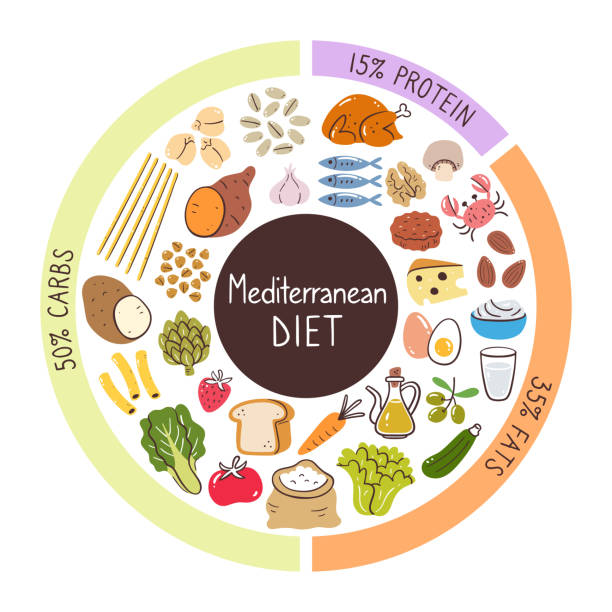
Health Benefits of the Mediterranean Diet
Numerous studies have proven that the Mediterranean diet isn’t just another food trend—it’s a scientifically supported, heart-healthy, anti-inflammatory, and life-extending dietary pattern.
Promotion of Cardiovascular Well-Being: The Mediterranean dietary pattern has been extensively associated with enhanced cardiovascular health. Through its emphasis on the consumption of monounsaturated fats, omega-3 fatty acids, and antioxidant-rich plant foods, it facilitates a significant reduction in low-density lipoprotein (LDL) cholesterol. This leads to a decreased incidence of atherosclerosis, thereby mitigating the risk of life-threatening cardiovascular events such as myocardial infarction and cerebrovascular accidents.
Facilitation of Effective Weight Regulation: By including abundant dietary fiber, complex carbohydrates, and health-promoting unsaturated fats, the Mediterranean diet promotes prolonged satiety and metabolic balance. This nutritional approach encourages sustainable weight control without imposing restrictive caloric limitations, thus supporting both physical health and psychological well-being.
Optimization of Cognitive and Neurological Functions: The frequent inclusion of neuroprotective foods—such as fatty fish, tree nuts, and cold-pressed olive oil—has been shown to support optimal brain function. These foods provide essential nutrients that may delay cognitive decline and reduce susceptibility to neurodegenerative conditions, including Alzheimer’s disease and various forms of dementia.
Mitigation of Chronic Inflammatory Processes: Owing to its high concentration of polyphenols, flavonoids, and other antioxidative compounds, the Mediterranean diet exerts an anti-inflammatory effect throughout the body. This systemic influence may significantly reduce the risk of developing inflammatory diseases such as rheumatoid arthritis, type 2 diabetes mellitus, and certain malignancies.
Contribution to Increased Longevity and Vitality: Populations adhering consistently to the Mediterranean way of eating—particularly those residing in longevity-associated regions known as “Blue Zones”—demonstrate notably higher life expectancies. This dietary tradition, coupled with active lifestyles and strong social connections, plays an instrumental role in extending health span and overall vitality.
Top Mediterranean Diet Recipes
Ready to experience the benefits for yourself ? Here are 8 delicious Mediterranean diet recipes that are easy to make, packed with nutrition, and bursting with flavor.
Greek Salad with Lemon-Oregano Dressing
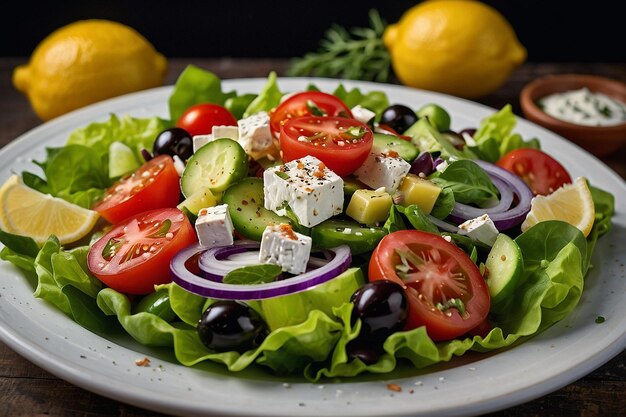
Greek Salad with Lemon-Oregano Dressing is a refreshing and flavorful dish that fits perfectly into healthy Mediterranean diet recipes. Made with crisp cucumbers, juicy tomatoes, red onions, Kalamata olives, and creamy feta cheese, this salad offers a vibrant mix of colors and textures.
The dressing is a simple blend of fresh lemon juice, extra virgin olive oil, garlic, and dried oregano. It adds a zesty, aromatic flavor that complements the vegetables without overpowering them. This light dressing highlights the natural taste of the ingredients and adds heart-healthy fats to the meal.
Greek Salad is easy to prepare and can be served as a side dish or a light main course. It’s perfect for warm-weather meals or as part of a larger Mediterranean spread. If you’re looking for nutritious and satisfying Mediterranean diet recipes, this classic salad is a delicious choice.
| Ingredients | |
|---|---|
| 2 cups cherry tomatoes | halved |
| 1 cucumber | sliced |
| 1 red onion | thinly sliced |
| 1/2 cup Kalamata olives | |
| 1/2 cup crumbled feta cheese | |
| 2 tbsp extra virgin olive oil | |
| Juice of 1 lemon | |
| 1 tsp dried oregano | |
| Salt and pepper | to taste |
| Instructions |
|---|
| 1. In a large bowl, combine tomatoes, cucumber, onion, and olives. |
| 2. In a small bowl, whisk olive oil, lemon juice, oregano, salt, and pepper. |
| 3. Drizzle dressing over the salad, toss well, and top with crumbled feta. |
| 4. Serve immediately or chill for 30 minutes to allow flavors to blend. |
Why it works: This refreshing salad is the epitome of the Mediterranean diet—colorful, plant-based, and rich in healthy fats and antioxidants.
Grilled Lemon Herb Salmon
Grilled Lemon Herb Salmon is a flavorful and nutritious dish that’s perfect for anyone exploring Mediterranean diet recipes. This simple yet elegant meal features fresh salmon fillets marinated in a blend of lemon juice, garlic, olive oil, and herbs like parsley and oregano.
Grilling the salmon enhances its natural flavors while keeping it moist and tender. The zesty lemon and aromatic herbs give the fish a bright, refreshing taste without needing heavy sauces. It’s rich in omega-3 fatty acids, which support heart and brain health—key benefits of the Mediterranean lifestyle.
Served with a side of vegetables or a light salad, Grilled Lemon Herb Salmon makes a complete, well-balanced meal. It’s easy to prepare and ideal for both weeknight dinners and special occasions. Among Mediterranean diet recipes, this dish is a delicious way to enjoy clean, wholesome ingredients.
| Ingredients | |
|---|---|
| 4 salmon fillets | |
| 3 tbsp olive oil | |
| Juice of 1 lemon | |
| 2 cloves garlic | minced |
| 1 tsp dried thyme | |
| 1 tsp dried rosemary | |
| Salt and pepper | to taste |
| Instructions |
|---|
| 1. Mix olive oil, lemon juice, garlic, thyme, and rosemary in a bowl. |
| 2. Marinate salmon fillets in the mixture for at least 30 minutes. |
| 3. Grill over medium heat for 4–5 minutes per side, or until fully cooked. |
| 4. Serve with steamed vegetables or a grain like quinoa. |
Why it works: Salmon is a fantastic source of omega-3 fatty acids, which support heart and brain health. The herbs add flavor without extra calories or salt.
Mediterranean Chickpea Stew
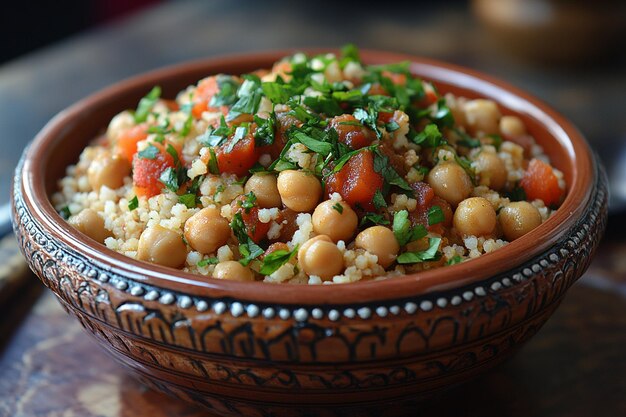
Mediterranean Chickpea Stew is a warm, hearty dish packed with flavor and nourishment. It’s a perfect example of how Mediterranean diet recipes can be both comforting and healthy. This stew features chickpeas simmered with tomatoes, onions, garlic, and a mix of herbs and spices.
Rich in plant-based protein and fiber, chickpeas help keep you full and satisfied. The tomatoes and olive oil add antioxidants, while spices like cumin and paprika bring depth and warmth to every bite. It’s a wholesome meal that supports heart health and digestion.
This stew is easy to make in one pot and ideal for meal prepping. Serve it with crusty whole-grain bread or a side of brown rice. As one of the most versatile Mediterranean diet recipes, it can be enjoyed on its own or as part of a larger spread.
| Ingredients | |
|---|---|
| 2 tbsp olive oil | |
| 1 onion | chopped |
| 3 garlic cloves | minced |
| 1 red bell pepper | diced |
| 1 zucchini | diced |
| 1 can (15 oz) chickpeas | drained |
| 1 can (14 oz) diced tomatoes | |
| 1 tsp cumin | |
| 1 tsp paprika | |
| Salt and pepper | to taste |
| Fresh parsley | for garnish |
| Instructions |
|---|
| 1. Sauté onion and garlic in olive oil until softened. |
| 2. Add diced bell pepper and zucchini; cook for 5 minutes. |
| 3. Stir in chickpeas, diced tomatoes, cumin, and paprika; simmer for 15 minutes. |
| 4. Season with salt and pepper, and garnish with fresh parsley before serving. |
Why it works: This one-pot meal is high in fiber, plant protein, and anti-inflammatory spices.
Whole Wheat Spaghetti with Spinach and Sun-Dried Tomatoes
Whole Wheat Spaghetti with Spinach and Sun-Dried Tomatoes is a wholesome, satisfying dish that fits beautifully into Mediterranean diet recipes. This meal combines nutrient-rich whole wheat pasta with sautéed spinach, sun-dried tomatoes, garlic, and olive oil for a simple yet flavorful experience.
Whole wheat spaghetti adds fiber and complex carbohydrates, helping to keep energy levels steady. The sun-dried tomatoes provide a concentrated burst of flavor, while the spinach adds vitamins and minerals. Garlic and olive oil bring everything together with traditional Mediterranean flair.
This pasta dish is quick to prepare and perfect for busy weeknights. It can be enjoyed on its own or paired with a protein like grilled chicken or fish. As one of many delicious Mediterranean diet recipes, it offers both taste and health benefits in every bite.
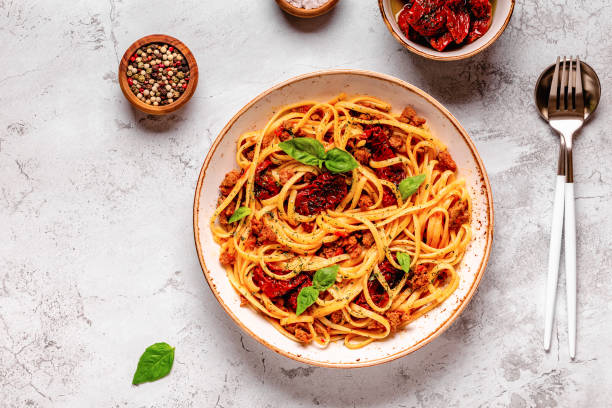
| Ingredients | |
|---|---|
| 8 oz whole wheat spaghetti | |
| 2 tbsp olive oil | |
| 3 garlic cloves | minced |
| 1 cup sun-dried tomatoes | chopped |
| 4 cups baby spinach | |
| 1/4 tsp chili flakes | |
| Parmesan cheese | optional, for topping |
| Instructions |
|---|
| 1. Cook whole wheat spaghetti according to the package instructions. |
| 2. In a pan, sauté garlic and sun-dried tomatoes in olive oil until fragrant. |
| 3. Add baby spinach and chili flakes; cook until spinach is wilted. |
| 4. Toss in the drained spaghetti and mix well. Top with grated Parmesan if desired. |
Why it works: A fiber-packed, meatless meal that’s full of Mediterranean flavor and heart-healthy fats.
Tabbouleh Salad
Tabbouleh Salad is a fresh and vibrant dish that’s a staple in many Mediterranean diet recipes. Made with bulgur wheat, finely chopped parsley, mint, tomatoes, cucumber, and green onions, it’s both light and satisfying. The salad is dressed with a simple mix of lemon juice and olive oil, which enhances its zesty flavor.
Rich in fiber and antioxidants, Tabbouleh supports digestive health and provides a refreshing contrast to heavier meals. The abundance of fresh herbs not only adds bold flavor but also delivers important nutrients. This dish is often served as a side, appetizer, or part of a larger mezze platter.
Tabbouleh is easy to prepare and makes a great option for meal prepping or picnics. As one of the most refreshing Mediterranean diet recipes, it highlights how healthy eating can also be full of color, texture, and flavor.
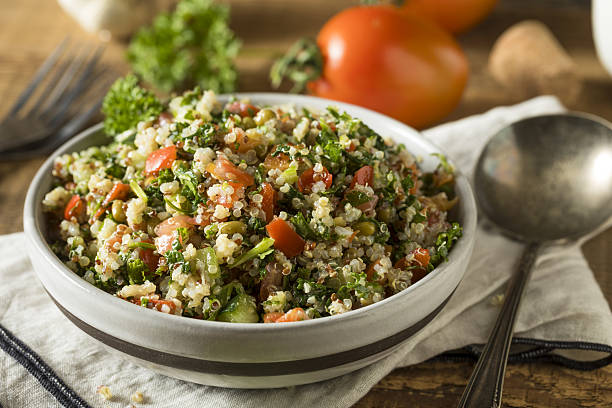
| Ingredients | |
|---|---|
| 1 cup bulgur wheat | |
| 1 1/2 cups boiling water | |
| 1/2 cup fresh parsley | finely chopped |
| 1/4 cup mint | chopped |
| 2 tomatoes | diced |
| 1 cucumber | diced |
| 2 green onions | chopped |
| Juice of 2 lemons | |
| 3 tbsp olive oil | |
| Salt and pepper | to taste |
| Instructions |
|---|
| 1. Soak bulgur in boiling water for 15 minutes, then drain excess water. |
| 2. In a large bowl, combine bulgur, parsley, mint, tomatoes, cucumber, and onions. |
| 3. Add lemon juice, olive oil, salt, and pepper. Toss well and chill for 30 minutes. |
Why it works: A refreshing and nutrient-dense salad that pairs beautifully with grilled meats or as a light lunch.
Stuffed Bell Peppers with Quinoa and Feta
Stuffed Bell Peppers with Quinoa and Feta is a colorful and satisfying dish perfect for those following Mediterranean diet recipes. These peppers are filled with a flavorful mixture of cooked quinoa, crumbled feta cheese, chopped vegetables, and herbs, creating a balanced and nutritious meal.
Quinoa adds plant-based protein and fiber, while the feta provides a creamy, tangy contrast. Fresh ingredients like tomatoes, onions, and parsley bring extra taste and texture, making every bite enjoyable. Baked until tender, the bell peppers become soft and slightly sweet, enhancing the filling inside.
This dish works well as a vegetarian main course or a hearty side dish. It’s easy to prepare and can be made ahead for busy days. Among Mediterranean diet recipes, stuffed peppers are a delicious and healthy way to enjoy whole grains, vegetables, and cheese all in one meal.
| Ingredients | |
|---|---|
| 4 bell peppers | halved and deseeded |
| 1 cup cooked quinoa | |
| 1/2 cup crumbled feta cheese | |
| 1/4 cup Kalamata olives | chopped |
| 1 tomato | diced |
| 1/4 cup chopped parsley | |
| 1 tbsp olive oil | |
| Salt and pepper | to taste |
| Instructions |
|---|
| 1. Preheat the oven to 375°F (190°C). |
| 2. In a bowl, mix quinoa, feta, olives, tomato, parsley, olive oil, salt, and pepper. |
| 3. Fill each halved bell pepper with the prepared mixture. |
| 4. Bake for 25–30 minutes, or until the peppers are soft and tender. |
Why it works: This dish is a complete meal with plant protein, fiber, and healthy fats. It’s also gluten-free and vegetarian-friendly.
Mediterranean Lentil Soup
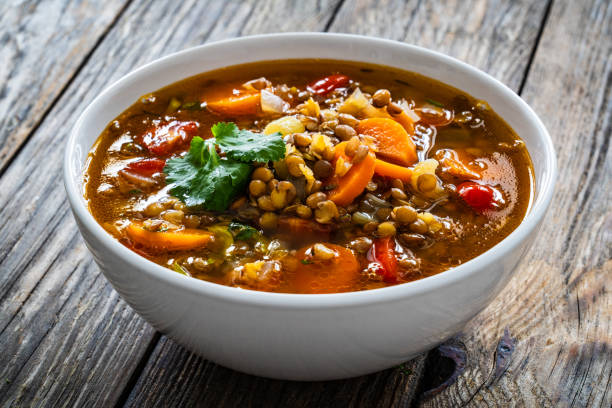
Mediterranean Lentil Soup is a hearty and nourishing dish that perfectly fits into Mediterranean diet recipes. Made with lentils, vegetables, herbs, and olive oil, this soup is both filling and flavorful. It’s ideal for a cozy lunch or a light dinner, offering warmth and comfort in every bowl.
Lentils are rich in plant-based protein, fiber, and essential nutrients, making them a great ingredient for heart and digestive health. Combined with vegetables like carrots, tomatoes, and onions, and seasoned with herbs like cumin and oregano, this soup is simple yet deeply satisfying.
Easy to prepare in one pot, Mediterranean Lentil Soup is great for meal prep and stays delicious for days. As one of the most classic and budget-friendly Mediterranean diet recipes, it shows how wholesome ingredients can create delicious, health-supportive meals.
| Ingredients | |
|---|---|
| 2 tbsp olive oil | |
| 1 onion | chopped |
| 2 carrots | diced |
| 2 celery stalks | diced |
| 2 garlic cloves | minced |
| 1 1/2 cups green lentils | |
| 6 cups vegetable broth | |
| 1 tsp cumin | |
| 1/2 tsp turmeric | |
| Salt and pepper | to taste |
| Lemon wedges | for serving |
| Instructions |
|---|
| 1. In a large pot, sauté onion, carrot, celery, and garlic in olive oil until soft. |
| 2. Add lentils, vegetable broth, cumin, and turmeric. Bring to a boil. |
| 3. Reduce heat and simmer for 30–35 minutes until lentils are tender. |
| 4. Season with salt and pepper. Serve with lemon wedges for added flavor. |
Why it works: Lentils are rich in iron and protein, and this hearty soup is perfect for meal prep.
Mediterranean Baked Eggplant (Imam Bayildi)
Mediterranean Baked Eggplant, also known as Imam Bayildi, is a classic dish featured in many Mediterranean diet recipes. This flavorful meal consists of eggplants stuffed with a savory mixture of onions, garlic, and tomatoes, all baked in olive oil until tender and aromatic.
Eggplant is a fiber-rich vegetable that absorbs flavor beautifully. In this dish, it’s combined with heart-healthy ingredients like olive oil and tomatoes, which offer antioxidants and anti-inflammatory benefits. The slow baking process allows the flavors to deepen, making each bite rich and satisfying.
Imam Bayildi is traditionally served warm or at room temperature and pairs well with rice, bread, or a fresh salad. As one of the most beloved Mediterranean diet recipes, it showcases how simple vegetables and herbs can create a delicious and wholesome meal.
| Ingredients | |
|---|---|
| 2 eggplants | halved lengthwise |
| 1/4 cup olive oil | |
| 1 onion | sliced |
| 3 garlic cloves | minced |
| 2 tomatoes | chopped |
| 1 tbsp tomato paste | |
| 1/2 tsp cinnamon | |
| Fresh parsley | for garnish |
| Instructions |
|---|
| 1. Preheat oven to 375°F (190°C). Score eggplant flesh and drizzle with olive oil. |
| 2. Place eggplants cut-side down and roast for 30 minutes. |
| 3. Meanwhile, sauté onion, garlic, and tomatoes in a pan. Add tomato paste and cinnamon. |
| 4. Spoon the mixture into the roasted eggplants. Bake for another 20 minutes. |
| 5. Garnish with fresh parsley before serving. |
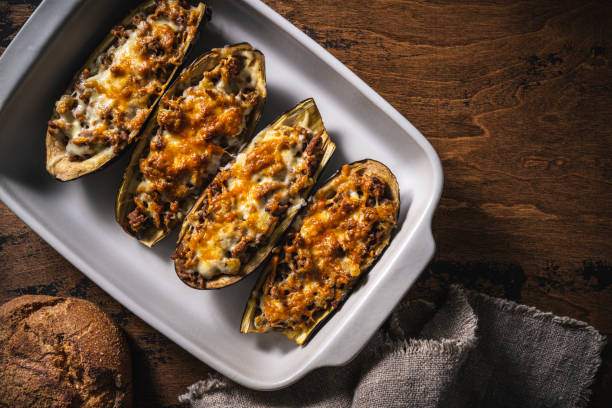
Why it works: A traditional dish from the Eastern Mediterranean, this is rich in flavor, antioxidants, and completely plant-based.
Conclusion
The Mediterranean diet is more than just a popular eating plan—it’s a long-standing, healthy way of life rooted in the traditional foods of countries around the Mediterranean Sea. It focuses on fresh vegetables, fruits, whole grains, lean proteins, and healthy fats like olive oil. These choices make it not only heart-healthy but also enjoyable and easy to maintain.
By adding Mediterranean diet recipes to your weekly meals, you’re making a smart move for your overall well-being. These recipes are full of flavor and variety, helping you eat mindfully without feeling restricted. From simple salads to hearty stews, each dish supports better health while keeping your taste buds happy.
Whether your goal is to lose weight, lower your cholesterol, or just enjoy healthier meals, this diet provides a balanced and delicious approach. So grab some olive oil, chop fresh veggies, and enjoy the journey to a healthier lifestyle—Mediterranean style.
FAQs
Q1: Is the Mediterranean diet good for weight loss ?
Answer: Yes, the Mediterranean diet can be effective for weight loss. While it doesn’t involve strict calorie counting or food elimination, its focus on whole foods, fiber-rich vegetables, healthy fats, and lean proteins naturally reduces hunger and prevents overeating. Many people find it easier to stick with than restrictive diets, leading to sustainable weight loss over time.
Q2: Can I follow the Mediterranean diet if I’m vegetarian or vegan ?
Answer: Absolutely. The Mediterranean diet is highly adaptable to plant-based lifestyles. Many core components—like vegetables, legumes, whole grains, fruits, nuts, and olive oil—are naturally vegetarian or vegan. Just substitute fish or dairy with plant-based proteins such as tofu, lentils, beans, and fortified dairy alternatives.
Q3: How often can I eat meat on the Mediterranean diet ?
Answer: Red meat should be eaten sparingly—ideally only a few times per month. Instead, the diet encourages lean protein sources like fish and seafood at least twice per week. Poultry, eggs, and dairy are consumed in moderation, while plant-based proteins are encouraged daily.
Q4: Is the Mediterranean diet expensive to follow ?
Answer: Not necessarily. While certain items like fresh fish, olive oil, or nuts can be pricier, the diet balances out by emphasizing budget-friendly staples like beans, lentils, whole grains, seasonal produce, and canned or frozen vegetables. Planning meals and buying in bulk can make the diet both healthy and cost-effective.
Q5: Do I have to drink wine on the Mediterranean diet ?
Answer: No, drinking wine is optional and not required to follow the Mediterranean diet. If you do choose to drink, red wine in moderation (one glass per day for women, up to two for men) is traditionally part of the diet. However, if you don’t drink or have medical reasons to avoid alcohol, you can still enjoy all the benefits of the Mediterranean lifestyle without it.


